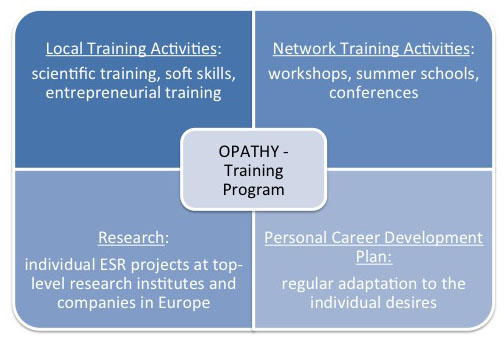The diverse and interrelated goals of OPATHY will provide 13 ESRs with a multidisciplinary training environment and empower them to embark in highly translational research projects within a multi-sectorial network composed of academia, clinics and companies (small and large). This LEARNING BY DOING approach will be complemented by training through general and specialized skills courses, and by secondments with one or more of the other partners. The planned scheme ensures that all ESRs will be exposed to an inter-sectorial mobility (e.g. academia to industry/clinic and vice versa) within their projects. The inclusion of the valorisation WP7 will support the training of OPATHY young researchers in the potential commercial utilization of the lead diagnostics tools, a key skill in translational research but usually not covered in standard training programs.
The network combines expertise in comparative and functional genomics, proteomics, bioinformatics, molecular diagnostics, and medical microbiology from seven academic groups (including two clinical centres), and four companies (including two SMEs). The proposed balanced research and training programs provide an excellent framework for ESRs to develop their careers at the interface of fundamental and applied clinical research. We will coordinate our training efforts with other initiatives that have complementary focuses, ensuring an efficient cross-talk and collaboration between existing training initiatives in Europe.
The training programme will cover three main aspects:
1. Engagement on an individual research project, supervised by the host institution in collaboration with a second OPATHY partner. The individual projects are designed to foster knowledge advance, and knowledge transfer among the partners. The trainees will fully integrate in the research environment of their host institutions with in-depth supervision by renowned researchers, and walk a research avenue that is realistic in the available time frame (see Gantt). They will have access to world-class technological facilities, locally and at the Network partners´ sites. They will all have at least two secondments, and one of them will be in a different sector.
2. Network-wide training activities to empower research and technological expertise, and to provide transferable skills such as courses on grant and paper writing, career development, communication, and ethics.
3. Training in entrepreneurship, translational research, and innovation, including secondments for all ESRs in the private sector and/or in clinical centres.

